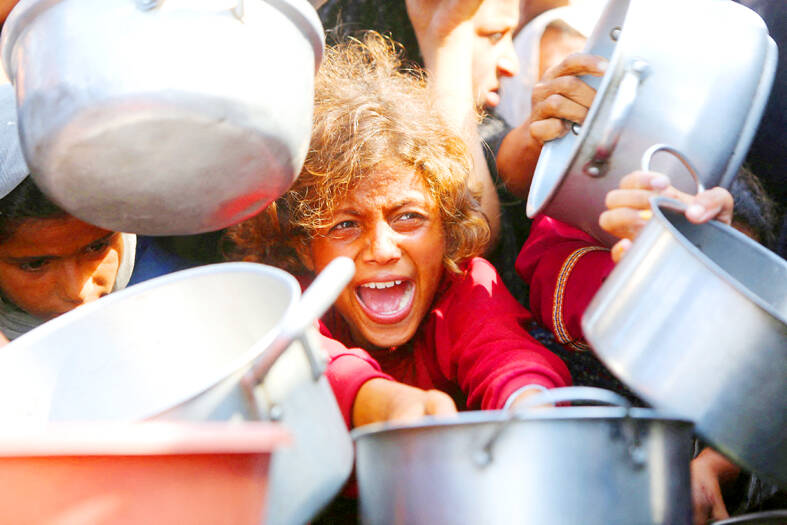The world’s leading authority on food crises on Friday said that the Gaza Strip’s largest city is gripped by famine, and that it is likely to spread across the territory without a ceasefire and an end to restrictions on humanitarian aid.
Famine is happening in Gaza City, home to hundreds of thousands of Palestinians, and could spread south to Deir al-Balah and Khan Younis by the end of next month, The Integrated Food Security Phase Classification (IPC) said.
The determination comes after months of warnings by aid groups that Israel’s restrictions of food and other aid into Gaza and its military offensive were causing starvation among Palestinian civilians, particularly children.

Photo: Reuters
Israel rejected the report, with Israeli Prime Minister Benjamin Netanyahu calling it an “outright lie.”
The grim milestone — the first time the IPC has confirmed a famine in the Middle East — is sure to ramp up international pressure on Israel.
Israel said it plans to seize Gaza City and other Hamas strongholds, an escalation experts said would exacerbate the hunger crisis.
The IPC said hunger has been driven by fighting and the blockade of aid, and magnified by widespread displacement and the collapse of food production in Gaza, pushing hunger to life-threatening levels across the entire territory.
More than half a million people in Gaza, about a quarter of its population, face catastrophic levels of hunger, with many at risk of dying from malnutrition-related causes, the report said.
The US Department of State sought to cast doubt on the report, saying the humanitarian situation in Gaza “is a serious concern,” but blamed Hamas and looters for the difficulties in delivering aid.
After the publication of images of emaciated children in Gaza and reports of hunger-related deaths in recent weeks, Israel announced measures to let more humanitarian aid in. Yet, the UN said what is entering is far below what is needed.
The Israeli military agency in charge of transferring aid to the territory, known as COGAT, called the report “false and biased,” saying significant steps had been taken to expand the amount of aid entering the strip in recent weeks.
The Israeli Ministry of Foreign Affairs said more than 100,000 trucks of aid have entered Gaza since the start of the war, including a massive influx in recent weeks.
However, experts said Gaza is still reeling from the tightening of the blockade from early March until mid-May, when Israel barred the import of all food, medicine and other goods.
“A rapidly increasing number of people, especially young children, are dying preventable deaths from starvation and disease, because Israel made starvation a core part of its campaign to control the strip,” International Crisis Group analyst Chris Newton said.
Formal famine determinations are rare.
According the IPC, a famine exists in an area when all three of the following conditions are confirmed: At least 20 percent of households have an extreme lack of food or are essentially starving. At least 30 percent of children six months to five years old have acute malnutrition or are wasting, based on a weight-to-height measurement; or 15 percent of that age group have acute malnutrition based on the circumference of their upper arm. And at least two people, or four children under five, per 10,000 are dying daily due to starvation or the interaction of malnutrition and disease.
The data analyzed between July 1 and Friday last week showed clear evidence that thresholds for starvation and acute malnutrition have been reached.
Gathering data for mortality has been harder, but the IPC said it is reasonable to conclude from the evidence that the necessary threshold has likely been reached.
The IPC warned that one-third of Gaza’s population could face catastrophic levels of hunger by the end of next month, and that this is probably an undercount.
World Peace Foundation executive director Alex de Waal said that had Israel allowed the IPC better access to collect data, a famine might have been determined months ago, which would have raised global awareness sooner.
“It seems that it’s necessary for experts to shout ‘famine!’ before the world takes notice, by which time it is too late,” he said.

STEPPING UP: Diminished US polar science presence mean opportunities for the UK and other countries, although China or Russia might also fill that gap, a researcher said The UK’s flagship polar research vessel is to head to Antarctica next week to help advance dozens of climate change-linked science projects, as Western nations spearhead studies there while the US withdraws. The RRS Sir David Attenborough, a state-of-the-art ship named after the renowned British naturalist, would aid research on everything from “hunting underwater tsunamis” to tracking glacier melt and whale populations. Operated by the British Antarctic Survey (BAS), the country’s polar research institute, the 15,000-tonne icebreaker — boasting a helipad, and various laboratories and gadgetry — is pivotal to the UK’s efforts to assess climate change’s impact there. “The saying goes

Police in China detained dozens of pastors of one of its largest underground churches over the weekend, a church spokesperson and relatives said, in the biggest crackdown on Christians since 2018. The detentions, which come amid renewed China-US tensions after Beijing dramatically expanded rare earth export controls last week, drew condemnation from US Secretary of State Marco Rubio, who on Sunday called for the immediate release of the pastors. Pastor Jin Mingri (金明日), founder of Zion Church, an unofficial “house church” not sanctioned by the Chinese government, was detained at his home in the southern city of Beihai on Friday evening, said

TICKING CLOCK: A path to a budget agreement was still possible, the president’s office said, as a debate on reversing an increase of the pension age carries on French President Emmanuel Macron yesterday was racing to find a new prime minister within a two-day deadline after the resignation of outgoing French Prime Minister Sebastien Lecornu tipped the country deeper into political crisis. The presidency late on Wednesday said that Macron would name a new prime minister within 48 hours, indicating that the appointment would come by this evening at the latest. Lecornu told French television in an interview that he expected a new prime minister to be named — rather than early legislative elections or Macron’s resignation — to resolve the crisis. The developments were the latest twists in three tumultuous

FIRST STAGE: Hamas has agreed to release 48 Israeli hostages in exchange for 250 ‘national security prisoners’ as well as 1,700 Gazans, but has resisted calls to disarm Israel plans to destroy what remains of Hamas’ network of tunnels under Gaza, working with US approval after its hostages are freed, it said yesterday. Israeli Minister of Defense Israel Katz said that the operation would be conducted under an “international mechanism” led by the US. “Israel’s great challenge after the hostage release phase will be the destruction of all Hamas terrorist tunnels in Gaza,” Katz said. “I have ordered the army to prepare to carry out this mission,” he added. Hamas operates a network of tunnels under Gaza, allowing its fighters to operate out of sight of Israeli reconnaissance. Some have passed under